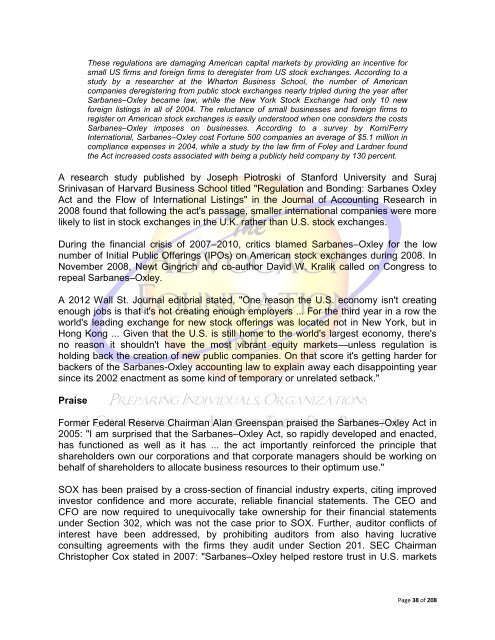The Sarbanes-Oxley Act of 2002
The Sarbanes-Oxley Act of 2002
The Sarbanes-Oxley Act of 2002
Create successful ePaper yourself
Turn your PDF publications into a flip-book with our unique Google optimized e-Paper software.
<strong>The</strong>se regulations are damaging American capital markets by providing an incentive for<br />
small US firms and foreign firms to deregister from US stock exchanges. According to a<br />
study by a researcher at the Wharton Business School, the number <strong>of</strong> American<br />
companies deregistering from public stock exchanges nearly tripled during the year after<br />
<strong>Sarbanes</strong>–<strong>Oxley</strong> became law, while the New York Stock Exchange had only 10 new<br />
foreign listings in all <strong>of</strong> 2004. <strong>The</strong> reluctance <strong>of</strong> small businesses and foreign firms to<br />
register on American stock exchanges is easily understood when one considers the costs<br />
<strong>Sarbanes</strong>–<strong>Oxley</strong> imposes on businesses. According to a survey by Korn/Ferry<br />
International, <strong>Sarbanes</strong>–<strong>Oxley</strong> cost Fortune 500 companies an average <strong>of</strong> $5.1 million in<br />
compliance expenses in 2004, while a study by the law firm <strong>of</strong> Foley and Lardner found<br />
the <strong>Act</strong> increased costs associated with being a publicly held company by 130 percent.<br />
A research study published by Joseph Piotroski <strong>of</strong> Stanford University and Suraj<br />
Srinivasan <strong>of</strong> Harvard Business School titled "Regulation and Bonding: <strong>Sarbanes</strong> <strong>Oxley</strong><br />
<strong>Act</strong> and the Flow <strong>of</strong> International Listings" in the Journal <strong>of</strong> Accounting Research in<br />
2008 found that following the act's passage, smaller international companies were more<br />
likely to list in stock exchanges in the U.K. rather than U.S. stock exchanges.<br />
During the financial crisis <strong>of</strong> 2007–2010, critics blamed <strong>Sarbanes</strong>–<strong>Oxley</strong> for the low<br />
number <strong>of</strong> Initial Public Offerings (IPOs) on American stock exchanges during 2008. In<br />
November 2008, Newt Gingrich and co-author David W. Kralik called on Congress to<br />
repeal <strong>Sarbanes</strong>–<strong>Oxley</strong>.<br />
A 2012 Wall St. Journal editorial stated, "One reason the U.S. economy isn't creating<br />
enough jobs is that it's not creating enough employers ... For the third year in a row the<br />
world's leading exchange for new stock <strong>of</strong>ferings was located not in New York, but in<br />
Hong Kong ... Given that the U.S. is still home to the world's largest economy, there's<br />
no reason it shouldn't have the most vibrant equity markets—unless regulation is<br />
holding back the creation <strong>of</strong> new public companies. On that score it's getting harder for<br />
backers <strong>of</strong> the <strong>Sarbanes</strong>-<strong>Oxley</strong> accounting law to explain away each disappointing year<br />
since its <strong>2002</strong> enactment as some kind <strong>of</strong> temporary or unrelated setback."<br />
Praise<br />
Former Federal Reserve Chairman Alan Greenspan praised the <strong>Sarbanes</strong>–<strong>Oxley</strong> <strong>Act</strong> in<br />
2005: "I am surprised that the <strong>Sarbanes</strong>–<strong>Oxley</strong> <strong>Act</strong>, so rapidly developed and enacted,<br />
has functioned as well as it has ... the act importantly reinforced the principle that<br />
shareholders own our corporations and that corporate managers should be working on<br />
behalf <strong>of</strong> shareholders to allocate business resources to their optimum use."<br />
SOX has been praised by a cross-section <strong>of</strong> financial industry experts, citing improved<br />
investor confidence and more accurate, reliable financial statements. <strong>The</strong> CEO and<br />
CFO are now required to unequivocally take ownership for their financial statements<br />
under Section 302, which was not the case prior to SOX. Further, auditor conflicts <strong>of</strong><br />
interest have been addressed, by prohibiting auditors from also having lucrative<br />
consulting agreements with the firms they audit under Section 201. SEC Chairman<br />
Christopher Cox stated in 2007: "<strong>Sarbanes</strong>–<strong>Oxley</strong> helped restore trust in U.S. markets<br />
Page 38 <strong>of</strong> 208

















